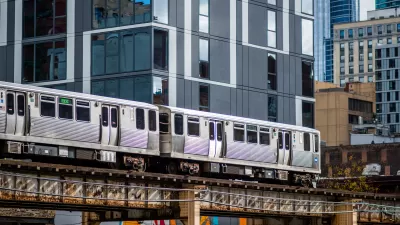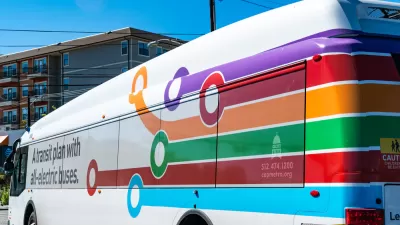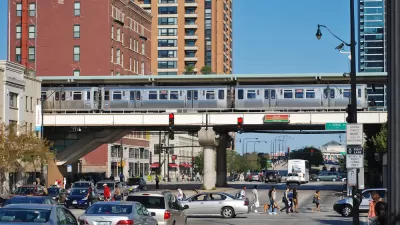The new legislation will promote more development near transit in the city’s underserved neighborhoods and improve safety for pedestrians and other road users.

A press release from the Chicago mayor’s office announces the passage of the city’s Connected Communities Ordinance, which updates Chicago’s Transit-Oriented Development (TOD) ordinance to promote more equitable outcomes. “Designed to stimulate equitable development near public transit, the ordinance creates jobs by catalyzing investment near transit, makes streets safer for all Chicagoans who walk, bike, drive or roll their wheelchair, and promotes affordable housing options near transit.
Calling it “the most comprehensive and equity-focused update to the City’s transit-oriented development policy yet,” the release states that “Key goals of the Connected Communities Ordinance [include] facilitating more investment near transit on the South and West sides of the City and preventing displacement and promoting affordable housing options in transit-rich communities on the North and Northwest sides – all while making sidewalks and streets safer everywhere.”
The city first passed a transit-oriented development (TOD) policy in 2016, but an analysis found that 90 percent of projects that took advantage of TOD incentives were located in Chicago’s wealthier neighborhoods. The new ordinance implements the recommendations made in the 2021 Equitable Transit-Oriented Development (ETOD) Policy Plan. One key component of the policy is expanding incentives to more areas of the city, including more bus corridors.

Maui's Vacation Rental Debate Turns Ugly
Verbal attacks, misinformation campaigns and fistfights plague a high-stakes debate to convert thousands of vacation rentals into long-term housing.

Planetizen Federal Action Tracker
A weekly monitor of how Trump’s orders and actions are impacting planners and planning in America.

In Urban Planning, AI Prompting Could be the New Design Thinking
Creativity has long been key to great urban design. What if we see AI as our new creative partner?

King County Supportive Housing Program Offers Hope for Unhoused Residents
The county is taking a ‘Housing First’ approach that prioritizes getting people into housing, then offering wraparound supportive services.

Researchers Use AI to Get Clearer Picture of US Housing
Analysts are using artificial intelligence to supercharge their research by allowing them to comb through data faster. Though these AI tools can be error prone, they save time and housing researchers are optimistic about the future.

Making Shared Micromobility More Inclusive
Cities and shared mobility system operators can do more to include people with disabilities in planning and operations, per a new report.
Urban Design for Planners 1: Software Tools
This six-course series explores essential urban design concepts using open source software and equips planners with the tools they need to participate fully in the urban design process.
Planning for Universal Design
Learn the tools for implementing Universal Design in planning regulations.
planning NEXT
Appalachian Highlands Housing Partners
Mpact (founded as Rail~Volution)
City of Camden Redevelopment Agency
City of Astoria
City of Portland
City of Laramie





























